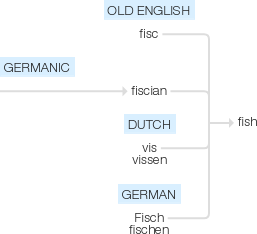Fish
Old English fisc (as a noun denoting any animal living exclusively in water), fiscian (verb), of Germanic origin; related to Dutch vis, vissen and German Fisch, fischen .
wiktionary
From Middle English fisch, from Old English fisċ(“fish”), from Proto-West Germanic *fisk, from Proto-Germanic *fiskaz(“fish”) (compare West Frisian fisk, Dutch vis, Danish fisk, Norwegian fisk, Swedish fisk, German Fisch), from Proto-Indo-European *peysḱ-(“fish”) (compare Irish iasc, Latin piscis).
Deverbal from to fish (etymology 3).
From Old English fiscian, from Proto-West Germanic *fiskōn, from Proto-Germanic *fiskōną.
Borrowed from French fiche(“peg, mark”).
etymonline
fish (n.)
"a vertebrate which has gills and fins adapting it for living in the water," Old English fisc "fish," from Proto-Germanic *fiskaz (source also of Old Saxon, Old Frisian, Old High German fisc, Old Norse fiskr, Middle Dutch visc, Dutch vis, German Fisch, Gothic fisks), perhaps from PIE root *pisk- "a fish." But Boutkan on phonetic grounds thinks it might be a northwestern Europe substratum word.
Popularly, since Old English, "any animal that lives entirely in the water," hence shellfish, starfish (an early 15c. manuscript has fishes bestiales for "water animals other than fishes"). The plural is fishes, but in a collective sense, or in reference to fish meat as food, the singular fishgenerally serves for a plural. In reference to the constellation Pisces from late 14c.
Fish (n.) for "person" is from 1750 with a faintly dismissive sense; earlier it was used in reference to a person considered desirable to "catch" (1722). Figurative sense of fish out of water "person in an unfamiliar and awkward situation" attested by 1610s. To drink like a fish is from 1744. Fish-story "incredible or extravagant narration" is attested by 1819, U.S. colloquial, from the tendency to exaggerate the size of the catch (or the one that got away).
Do not tell fish stories where the people know you; but particularly, don't tell them where they know the fish. ["Mark Twain," in "More Maxims of Mark" by Merle Johnson (1927)]
To have other fish to fry "other objects which invite or require attention" is from 1650s. Fish-eye as a type of lens is from 1961. Fish-and-chips is from 1876; fish-fingers from 1962.
fish (v.)
Old English fiscian "to fish, to catch or try to catch fish" (cognates: Old Norse fiska, Old High German fiscon, German fischen, Gothic fiskon), from the root of fish (n.). Related: Fished; fishing.
